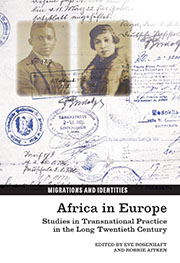Book contents
- Frontmatter
- Contents
- Acknowledgements
- List of Illustrations
- List of Abbreviations
- List of Contributors
- 1 Introduction
- I Enacting Identity: Individuals, Families and Communities
- II Authenticity and Influence: Contexts for Black Cultural Production
- III Post-colonial Belonging
- IV Narratives/Histories
- 12 Middle Passage Blackness and its Diasporic Discontents: The Case for a Post-War Epistemology
- 13 Black and German: Filming Black History and Experience
- 14 Excavating Diaspora: An Interview Discussing Elleke Boehmer's Novel Nile Baby
- 15 Afterword
- Bibliography
- Index
14 - Excavating Diaspora: An Interview Discussing Elleke Boehmer's Novel Nile Baby
from IV - Narratives/Histories
- Frontmatter
- Contents
- Acknowledgements
- List of Illustrations
- List of Abbreviations
- List of Contributors
- 1 Introduction
- I Enacting Identity: Individuals, Families and Communities
- II Authenticity and Influence: Contexts for Black Cultural Production
- III Post-colonial Belonging
- IV Narratives/Histories
- 12 Middle Passage Blackness and its Diasporic Discontents: The Case for a Post-War Epistemology
- 13 Black and German: Filming Black History and Experience
- 14 Excavating Diaspora: An Interview Discussing Elleke Boehmer's Novel Nile Baby
- 15 Afterword
- Bibliography
- Index
Summary
The following conversation grew out of a presentation on Elleke Boehmer's novel Nile Baby (2008) at the ‘Africa in Europe’ conference in Liverpool in October 2009. The concept of ‘Africa in Europe’ provides a discursive framework for the interview as a whole. In her fictional as in her non-fictional work, Elleke Boehmer has long been concerned with questions of migrancy, belonging and diaspora. Likewise, the interviewer John Masterson's fascination with Nile Baby stems from his own research interests in these areas, as well as how they intersect with contested ‘body politics’ more widely. Whilst the seed for the interview was planted in the UK, it was cross-fertilised between the African and European continents, as seems entirely appropriate in relation to some of the overarching and transnational concerns of both conference and novel. On both sides, the conversation was self-consciously informed by that contrapuntal principle so integral to the vision of the late Edward Said, with the play between question and response designed to produce its own kind of rhythm.
Interview
John Masterson (JM): I would like to start by situating myself in relation to your 2008 novel Nile Baby, which, in turn, should set up some of the areas we might cover throughout the interview. I was in the audience when you read an extract from your book at the ‘Things Fall Apart at 50’ conference at SOAS, London in October 2008 alongside Abdulrazak Gurnah and Chimamanda Ngozi Adichie.
- Type
- Chapter
- Information
- Africa in EuropeStudies in Transnational Practice in the Long Twentieth Century, pp. 248 - 260Publisher: Liverpool University PressPrint publication year: 2013

